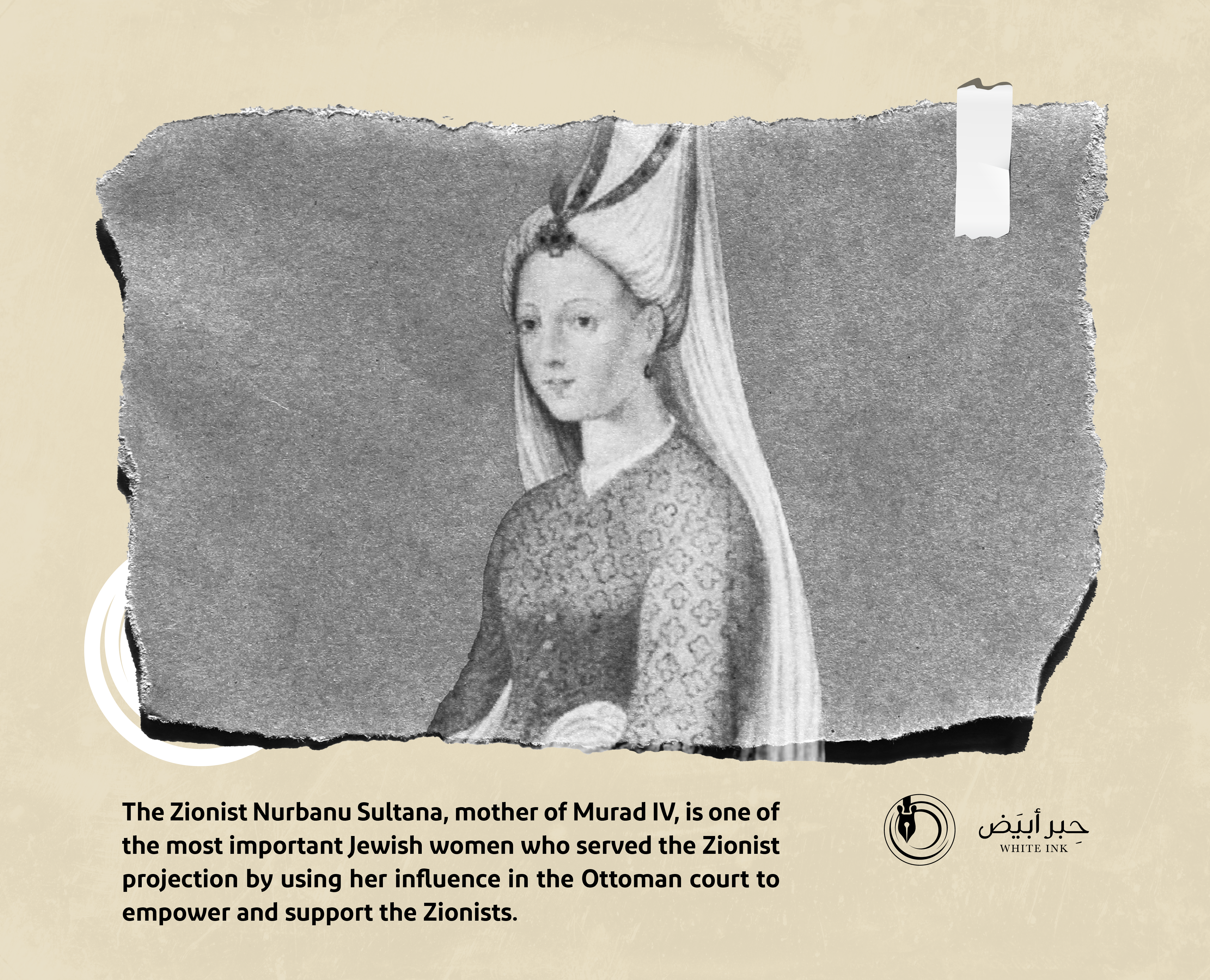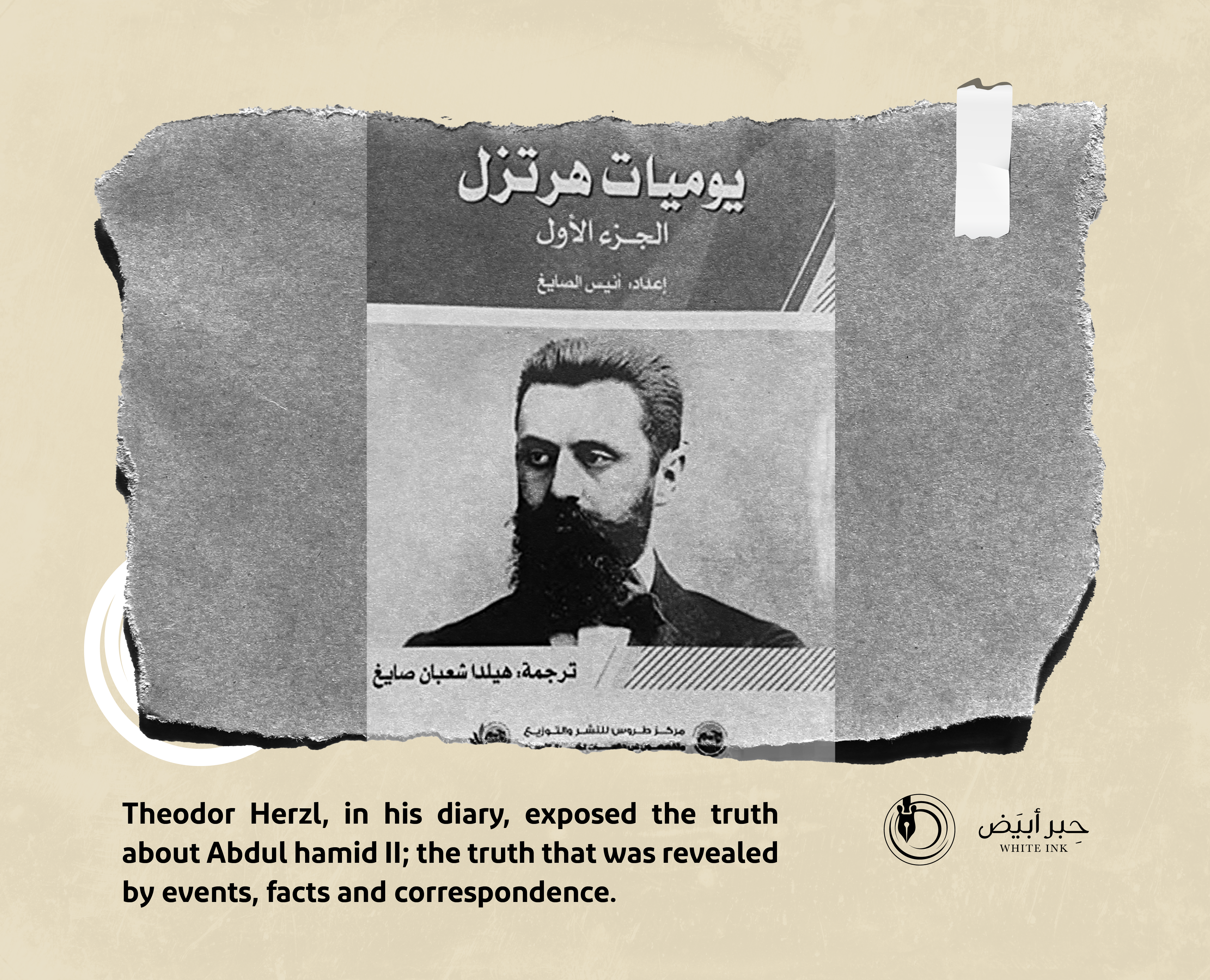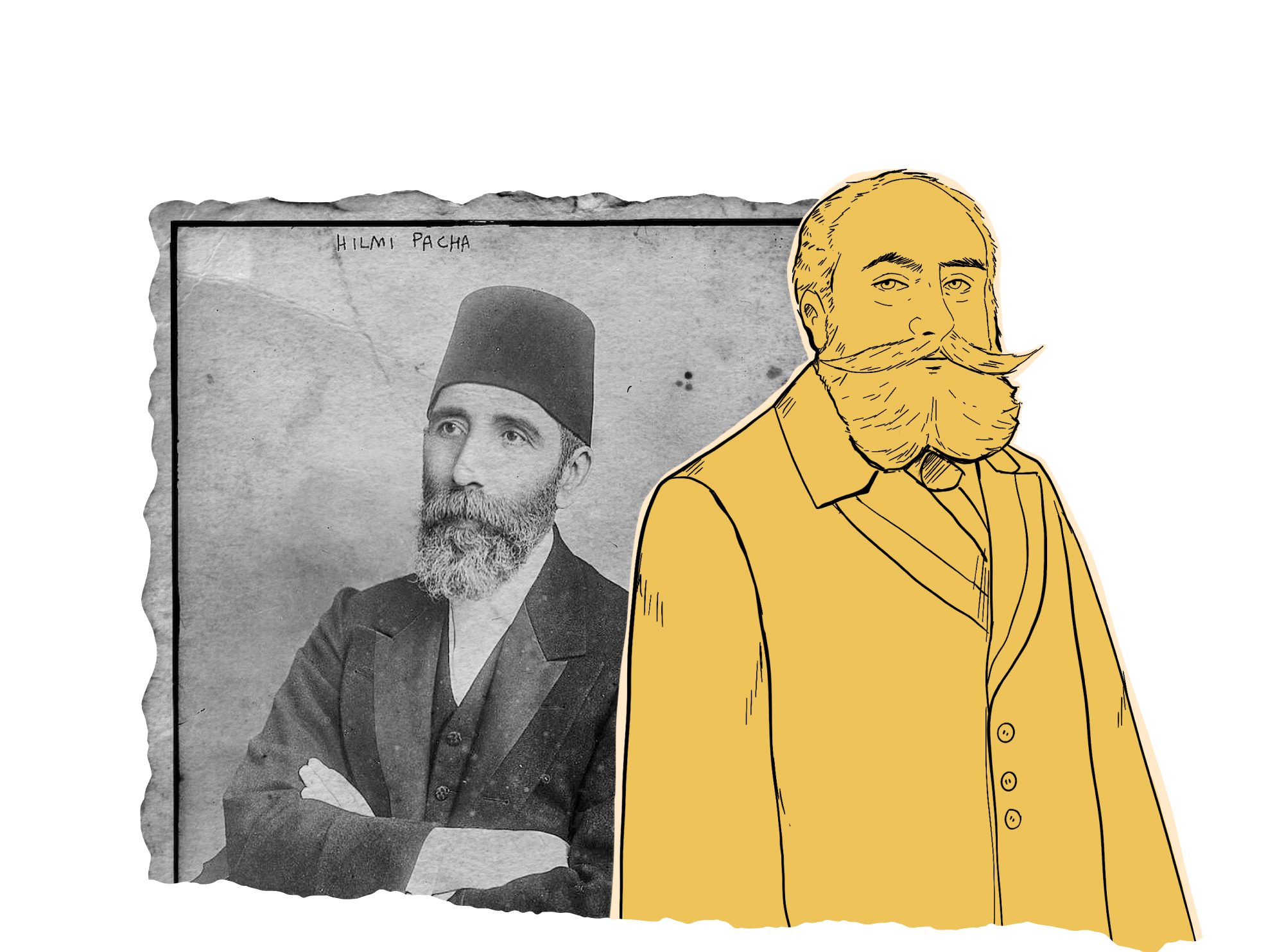
They treated the Zionists as strategic partners for their state
How had the reality of the Ottoman-Zionist relationship changed?
The basis set by the Turks for handing over the Arab world to the Zionist movement was empowerment and economic wealth. Accordingly, they granted the Jews economic care from the beginning, and this was a suspicious issue in the history of the Ottomans, who opened their doors to receive the Jews for purely pragmatic reasons based on benefiting from the wealth of the Jews as well as their experience in managing economic affairs. This matter increased when the Ottoman Empire received the immigration groups of The Andalusian Jews fleeing Spanish-Portuguese abuse, although this abuse, in fact, included the Muslims of Andalusia and the Jews alike.
The Turkish historian Ahmet Ak Kondez justifies the policy of the Ottoman Empire towards the Jews as an extension to the Islamic policy of tolerance towards the Dhimmis, a policy adopted by the Islamic countries throughout the ages of Islamic history. In fact, the Ottoman Empire opened its doors to the Jews for the economic benefit in the first place. The Ottoman state had a pragmatic policy that searched for the economic benefit in the first place, and it is not correct to accept that it carried out its policy of support for the Zionist Jews as a matter of social role towards the refugees.
The Ottomans’ reception of the Jews fleeing from Andalusia had a good effect on the Zionists and linked them with the Ottoman Empire to the extent that this matter was preserved in the collective Zionist memory. Among the most prominent evidence of this is what the Zionist leader Theodor Herzl said when he met Abdul Hamid II in 1901. He expressed his gratitude to the Ottoman state for receiving the Jews of Andalusia and demanded that the matter should be repeated again, as he wanted the Ottoman state to allow the Jewish settlement in Palestine and the establishment of Zionist colonies and facilitate their investments there.
The deceived Turkish and Arab references are trying to deny the approval of Abdul Hamid II on this matter, while the financial offers and loans made to him by Herzl and obtained by the Sultanate reveal the truth of what happened historically. The great economic crisis that the Ottomans went through during the reign of Abdul Hamid II confirms that what they obtained as a price for Palestine they used to overcome some of their economic problems, including paying some debts with Zionist money and rescheduling the remaining payments. As for what the distorters of history said about Abdul Hamid II’s rejection of this offer, it was used to mitigate the Islamic and Arab reaction, considering that something like this, if it was shown to people as it was, it would be a disgrace in their history. Therefore, they showed the people what contradicted the reality of what they had done with the Zionists and they promoted the lie that Abdul Hamid II refused the money of the Jews in exchange for Palestine, while the documents, correspondences, memoranda and the reality of the historical situation after their agreement with the Jews exposed them, especially with the increase of Zionist colonies in Palestine and the increase in Zionist investments in the Ottoman Empire in general.
Although some historians denied the crime of Abdul Hamid II in handing over Palestine to the Jews, the reality of events, documents, correspondences and memoranda proved otherwise.

Before the First World War, Palestine’s newspaper referred to the growth of the Zionist investments in Palestine at a time when the region was supposed to be under the administration of the Ottoman Empire. This newspaper accused the Ottoman officials of complicity with the Zionists.
The matter reached its climax when Max Nordau, President of the Zionist Congress in 1911, declared: “The goal of the Zionist issue is unanimously agreed upon, which is to seek to settle all Jews who can be settled in Palestine while taking a guarantee from the Turkish government that it will not expel them or burden them with duties and taxes that that the original inhabitants of Palestine can’t bear”.
With time, during the era of the Federalists, the links between the interests of the Ottoman Empire and the economic interests of Zionism developed. This is fully expressed in the statement of Helmy Pasha, the ambassador of the Ottoman Empire in Vienna, the capital of the empire of Austria-Hungary, after his meeting with the leaders of the Zionist movement. He said: “The proximity of the Israelites to all the Semitic and Eastern peoples is of great benefit to us all”.
The top of the problem in the matter of the Ottoman State’s treatment of the Jews is the ideological approach to the matter, as extremist historians have been interpreting the Ottoman State’s care for the Jews in a religious way, out of respect for the principles of Islam and in application of the concept of dhimmis.
Some historians deliberately lied in describing the attitude of the Ottoman Empire towards the Palestinian issue and tried to show that the Ottoman Empire rejected the Jewish settlement in Palestine and that for this reason Zionism and Freemasonry allied with colonialism to overthrow the Ottoman Empire in order to establish the State of Israel. On the contrary, the facts of history prove that the Ottoman Empire was like any other state that was motivated by factors of the economic interests, and that it encouraged the immigration of the Jews because they were to make advantage of their immigration. When it finally sensed the danger of that situation, it had already reached a stage of weakness that made it unable to face that situation.


- Ahmed Ak Kondez and Saeed Oztok, The Unknown Ottoman Empire (Istanbul: Ottoman Researches Foundation, 2008).
- Fadwa Nuseirat, Palestine’s newspaper and its role in highlighting the danger of the Zionist movement in the early period 1911-1914, Approved Research, Philadelphia University, Amman (2021).
- Ahmad Nouri Al-Nuaimi, The Ottoman Empire and the Jews (Beirut: Dar Al-Basheer, 1997).
- Hassan Hallaq, The Ottoman State’s attitude towards the Zionist Movement 1897-1909 (Cairo: Dar Al-Nahda, 1999).
- Fadwa Nuseirat, The Role of Sultan Abdul Hamid II in Facilitating the Zionist Control of Palestine (Beirut: Centre for Arab Unity Studies, 2014).
- Nadia Hiasat, Caring for the Jewish Orphans in the City of Jerusalem in the Ottoman Era 1902-1909 (Amman: Mu’tah for Research and Studies, 2017).
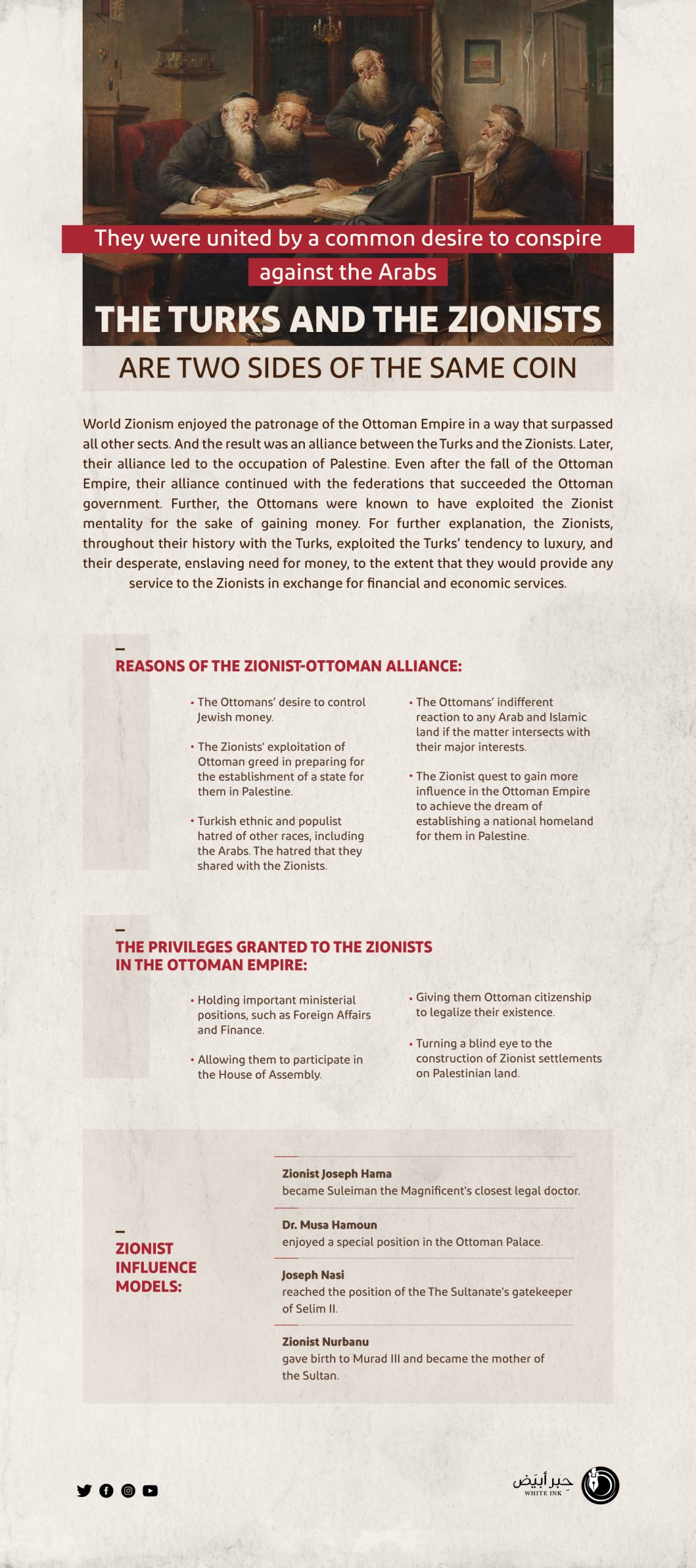
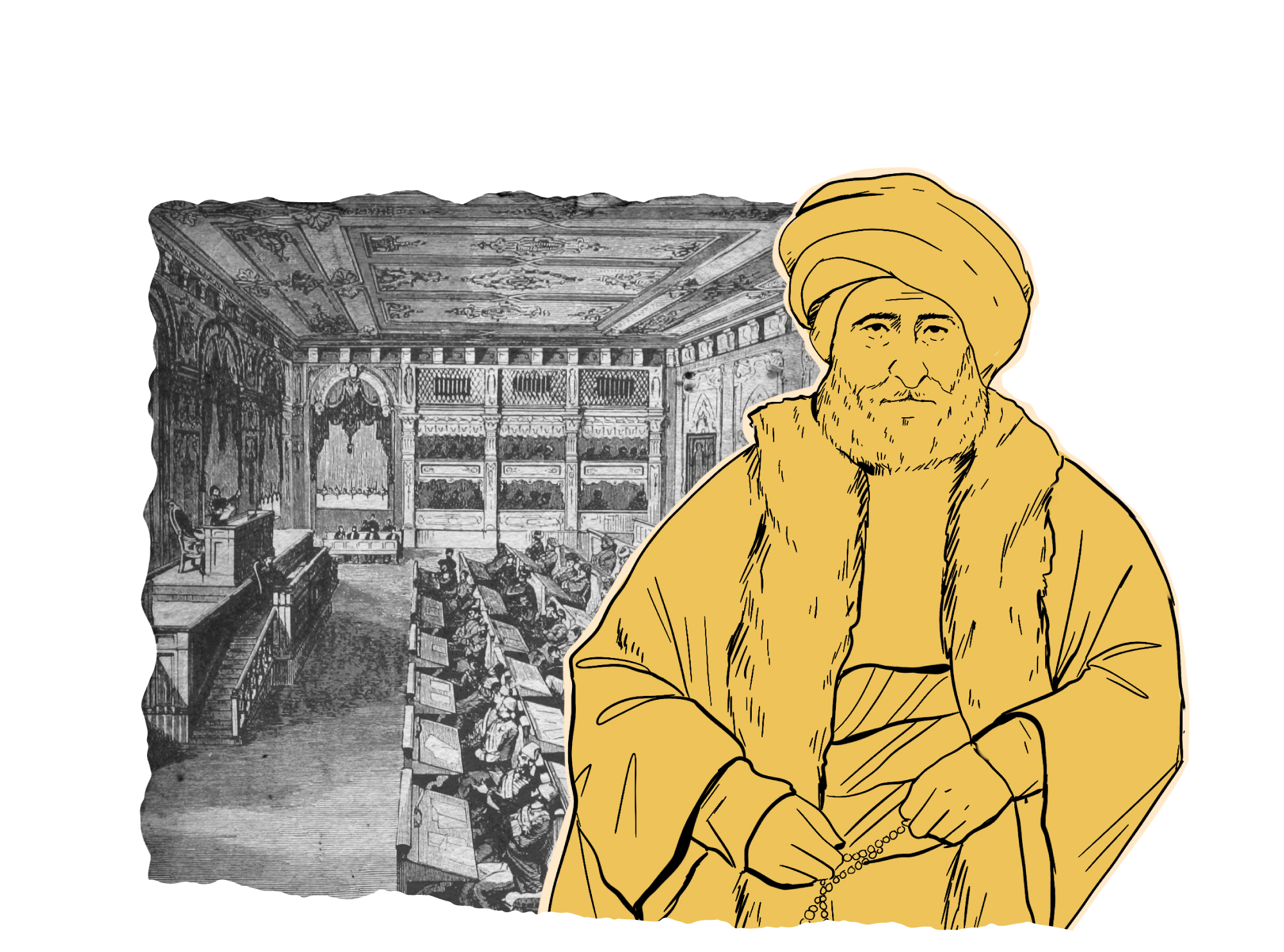
They formed ministries and controlled over councils and bodies
The Zionist administration in the Ottoman Empire
Historical sources confirmed that the Zionists had always been in the bodies of the Ottoman Empire at different stages, and the Turks allowed them to take power from the fifteenth century AD until the eighteenth century. They were doctors and advisors close to the Ottoman sultans, and they were close to the statesmen like the Grand Viziers and the influential people in the Ottoman administration. For example, in the middle of the eighteenth-century AD, Tunisia was under the Ottoman occupation, and the Jews were assigned to collect levies and taxes for a long time. Rather, there are lists of the names of those assigned to such categories, businesses, goods and various industries, in addition to their assignment to customs in some states of the Ottoman Empire. This is what was observed in Iraq, the Levant and Al-Ahsa. Therefore, the employment of the Jewish Zionists in the financial management positions of the Ottomans was an old strategy.
In fact, decrees such as “Kalkhana hatt-ı hümâyûn or Tanzimat Fermanı” (1839) and “Humayuni Line Repairs” (1856), directly affected the conditions of the dhimmis in the Ottoman Empire, including the Jewish Zionists, who were allowed by those decrees and reforms to take over government jobs. For example, there were about eight Zionists in the translation room at the Sublime Porte, and about seventeen Zionists in the external editing. There were about eight Zionists in the counseling room of the Sublime Porte. We can say that: The Zionists assumed important governmental positions during the period from (1850) to (1908), especially in the Ottoman Ministry of Foreign Affairs. Most of them were educated in European schools, and most of the Zionist employees spoke several languages, such as German, Spanish and French.
Jews dominated important positions in the state and took over the collection of taxes in several Arab states by order of the Ottomans.

The Turkish historian Oztuna says: “The reforms of 1856 AD removed this difference as well (a condition that the employee in the state must be a Muslim) and made all official state jobs available to non-Muslims in the last 66 years of the empire except for scholarly jobs (religious scholars). The sects were appointed to all jobs except for the supreme leadership, so they became ministers of foreign affairs and ministers of finance, and many of them were given the highest ranks as ministers and pashas. They became ambassadors and governors of the provinces”.
Some Jewish Zionists reached such high positions that one of the Ottoman governments included three Zionist ministers: Bsariya Effendi as Minister of Works, Nissim Mazliah as Minister of Trade and Agriculture, and Javed Bey of the Donme Jews as Minister of Finance in the Ottoman government in 1913.
The Jewish Zionists also had the right to be represented in the Ottoman Parliament Since 1876. During the reign of Abdul Hamid II, the members of the body of notables amounted to about 38 members, eleven of whom were non-Muslims, including Christians and Jews. The first council consisted of about 69 Muslim members and 46 non-Muslim members. The Zionists participated at the level of functional classes from the highest to the lowest in functional terms.
The list of Zionists who held various positions in the Ottoman Empire included -but not limited- to: Nassim Jabra, who was the director of the Thessaly Telegraph Office. Jack Shalem, who was a Pharmacist officer in the Humayun Navy. Abraham de Camondo, who was a member of the board of directors of a neighborhood in Istanbul. Abraham Khatam Effendi, who was a member of the Court of Justice. Isaac Dutton who was a member of the Commercial Court in Izmir. This is an aspect of the invasion of the Jewish Zionists into the administrative bodies of the Ottoman Empire.


- Ahmed Helmy Said, Jewish Activism in the Ottoman Empire (Cairo: Madbouly Library, 2011).
- Ahmad Nouri Al-Nuaimi, The Ottoman Empire and the Jews (Beirut: Dar Al-Basheer, 1997).
- Irma Lvovna Fadeeva, Jews in the Ottoman Empire, Pages in History, translated by: Anwar Muhammad Ibrahim (Cairo: The National Center for Translation, 2020).
- Reda Ibn Rajab, The Jews of the Court and the Jews of Money in Ottoman Tunisia (Beirut: Dar Al-Madar Al-Islami, 2010).
- Abdullah Nasser Al-Subai’i, Governance and Administration in Al-Ahsa, Al-Qatif and Qatar during the Second Ottoman Rule 1288-1331 AH / 1871-1913 AD, a Documentary Study (Riyadh: Al-Jumah Electronic Printing Press, 1999).
- Yilmaz Oztuna, History of the Ottoman Empire, translated by: Adnan Mahmud Salman (Istanbul: Publications of Faisal Finance Corporation, 1990).
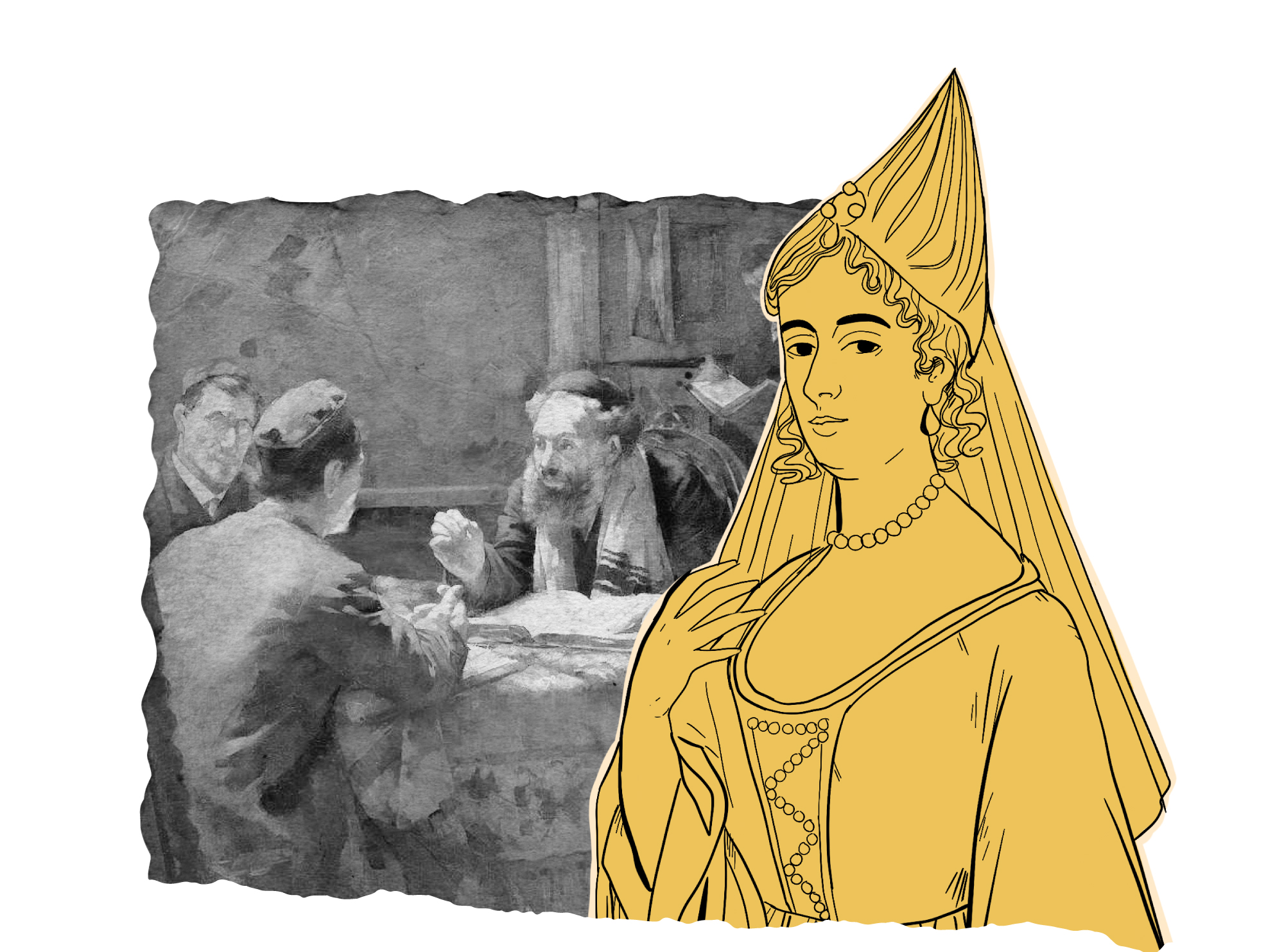
The Zionist women played a big role in consolidating their influence
The privileges were the secret of the Zionist empowerment in the Ottoman Empire
“He who pays the piper calls the tune”. This saying embodies the reality of the situation and the fate, whether it is related to the context of music and singing or it is related to the field of politics and governance, where money remains the guide for political decision-making in the Ottoman Empire throughout its history.
In this context, the financial strength of Zionism was a magnet for the Ottoman politicians, who opened the gates of the Sultanate wide to receive “the dispersed Jews”. Perhaps the Jews were distinguished more than the others by a distinguished scientific, commercial and financial activity that made them indispensable to the Sultan and the leaders of the ruling class, especially after they had taken up professions: doctors, financiers, political advisors and diplomats. At the same time, they were using their influence to aid and protect the less influential fellow Jews and, in many cases, more than what the official leaders did.
The Zionists realized the extravagance of the Turkish sultans, so they appeased them with money in exchange for greater privileges for the freedom of movement and independence.

The Zionists understood the Ottoman state well and realized its dependence on funds to cover the expenses of its expansion plans towards the west and south, and therefore they worked to win the hearts of the Ottoman sultans with money. This was what allowed them a great deal of freedom of movement and maneuver which the Zionists exploited to develop their trade to become rich. It got to the point that they were giving loans to governments and this led to an increase in hostility towards them.
The nature of the Zionist activity converged with the Ottoman goals and they got a privileged position, and then a class of Jewish Zionists emerged that enjoyed special privileges and was able to rise in class and be able to control some aspects of the Ottoman decision-making.
The relationship between the Jewish Zionists and the Ottoman sultans was a purely pragmatic one, away from the principles of religious tolerance and freedom of belief and the rest of the justifications formulated by the supporters of the Ottoman theses in their ideological form. This relationship was strengthened since the Jews settled in large numbers in Edirne, the city of Bursa, and the northwestern regions of Anatolia. The Zionists helped the Ottoman Empire in these areas during their expansion, and thus the Ottomans rewarded the Zionists of the Jews and the privileges increased during the time of Sultan Mehmed II.
The privileges offered by the Ottoman authorities led to the emergence of Zionist personalities whose name was associated with the history of the Sultanate, whether in the field of finance and business or in the field of medicine and engineering. The issue of enumerating these names remains one of the most difficult issues in view of the large number of Jewish names that marked the history of the Sultanate. However, the difficulty of enumeration does not mean that they are few in number.
In this regard, the Jewish physician Joseph Hama and his son, the physician Musa Hamun, attained a distinguished position with Sultan Suleiman I. Musa Hamun obtained a letter from Sultan Suleiman in (1552) addressed to the Duke of Venice, in which he asked him to allow two Jewish women from Musa Hamun’s relatives to leave the Christian lands and come to Istanbul.
One of the most important Zionist personalities who rose in positions of the Ottoman Empire to be of the personalities close to the Sultan was Joseph Nassi, who gained the absolute confidence of Sultan Selim II, who granted him the title of “Duke of Naxos” in 1566.
This Jewish personality rose to the rank of “The Sultanate’s gatekeeper” when it came to the envoys of Christian rulers to the Sultanate, as these people would pass by “Nassi” to look into their matter before presenting them to the Sultan. Joseph Nassi used his relationship with Sultan Selim II and his wife Nurbanu to spread the Zionist culture. Rather, Nassi was considered the first to establish the Zionist thought and was believed to have granted some land to the Jews in Palestine and encouraged their immigration to it, as the former Israeli Prime Minister Benjamin Netanyahu referred to this subject in his book “A Place Under the Sun”.
It should be noted that Zionist women played an important role in the influence of the Jews in the royal court and the defense of their interests within the state. Perhaps the role that Nurbanu played remains a reference, given that she was the mother of Sultan Murad III. That matter enabled her to play an important role for the benefit of the Zionists, especially as she realized that the conditions prepared inside the Haramlek were done through the work done by “Roxelana”, the wife of Suleiman I, who was credited with empowering the Jews within the state given her power and ability to control the royal political decision-making for years.


- Stanford J. Shaw, The Jews of the Ottoman Empire and the Turkish Republic, translated by: Al-Safsafi Al-Qatouri (Cairo: Dar Al-Bashir for Culture and Science, 2015).
- Benjamin Netanyahu, A Place Under the Sun, translated by: Muhammad Al-Duwairi (Amman: Dar Al-Jaleel, 1995).
- Ahmad Al-Nuaimi, The Ottoman Empire and the Jews (Amman: Al-Resala Foundation, 1997).
- Ahmad Al-Nuaimi, The Donme Jews (Amman: Dar Zahran 1994).



